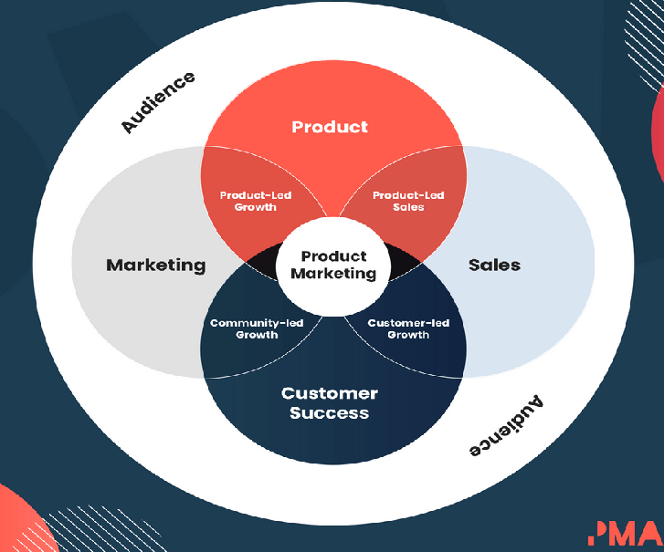The Venn diagram that comes up when you search for the basics of product management is as follows:

That’s a fairly simplistic depiction of what product management involves.
Product management lives at the intersection of business, technology, UX, and arguably now, CX. This important function plays a critical role in ensuring that products meet customer needs and expectations, that new products and features have product-market fit, and that the product is delivering results for the business.
Under business come the hard skills:
- Strategic thinking - Analyze market trends, customer needs, and business objectives
- Create a road map and ruthless business prioritization plan.
- Understand customers
- Business acumen - Understand key financial aspects of a company such as Monthly Recurring Revenue (MRR), customer lifetime value (CLV), profit margin, budgets, etc
- Ability to innovate
Under UX comes:
- Having an understanding of UX principles, best practices, and processes.
- Having a user-centric approach.
Under tech comes:
- Understanding of the latest technologies so they can interface with engineers and translate their vision into a real product using optimal technologies.
Other than these three basics, there are many satellite areas around these main planets that product managers should know about and be proficient in order to excel and distinguish themselves in what they do. They are
1. Product Management Marketing (PMM) – How product and features are marketed to customers.
2. Finance – Basic company financials and valuing innovation.
3. UX paradigms – UX factors like learnability, efficiency, memorability, errors, satisfaction.
4. Product operations – Focus on optimizing processes, tools, data analytics, and cross-functional collaboration.
There are other satellites like Project Management, Sales and Business Development, Customer Success and Support, Data Analysis and Business Intelligence, Operations, and Supply Chain management that I will not cover as part of this series.
I will write about each of these satellites as a four-part series. This article is dedicated to the first satellite, PMM – Product Marketing Management.
What is product marketing management?
A product marketing manager (PMM) is a professional responsible for the positioning, messaging, and overall marketing strategy of a product. PMMs act as a bridge between product development, sales, and marketing teams to ensure a cohesive approach to bringing a product to market. They conduct market research to understand customer needs, define target audiences, and create compelling value propositions.
PMMs also develop go-to-market plans, oversee product launches, and work on optimizing product performance post-launch. Their role involves crafting compelling stories around the product, guiding product development with market insights, and supporting sales with the necessary tools and information to drive product adoption and revenue growth.

Product Marketing Alliance’s 2023 State of Product Marketing report uncovered the most common tasks they work on
- Product positioning and messaging (90%)
- Managing product launches (87%)
- Creating sales collateral (81%)
- Storytelling (68%)
- Sales enablement (67%)
- Building personas (64%)
- Competitive intelligence (59%)
- Website management (58%)
- Customer segmentation (43%)
How is PMM usually structured?
In my current company, I have a delightful PMM who works with me from the moment an item is picked from the backlog until it goes live. We have weekly 1:1s with updates on the feature, getting early feedback and input on the product’s UX and customer value from the PMM.
As the feature gets close to release, all the release activities are planned to ensure that customers, support, and sales teams are aware of the new feature. Depending on the reach of the feature, press releases, social media marketing, etc., are planned. Each company could have a different structure of how PMM interacts with PM. But the fundamentals remain the same.
If product managers work hard on their feature/product, nurturing it from conception to birth, but then the child is never taken outside to show to the family or is shown only to a few family members, then the rest of the family will never know you had a baby. Consequently, no one will show up to see the baby and give them delightful gifts. Uncles and aunts will be deprived of seeing the baby grow, missing an important family experience.
I recommend that product managers stay two steps ahead in their PMM game with proper training and knowledge. This knowledge will help them immensely when working with PMMs. They can proactively suggest the right channels and strategies for the Go-to-Market plan of the feature.
After all, it’s the product manager who has the most complete knowledge of the feature, as they were involved in every step of its development and have context from discussions with various development stakeholders. If they combine their PM skills with the fundamentals of PMM, they will be unbeatable. They can ask PMM the right questions to ensure a complete and comprehensive GTM strategy.
I am not suggesting that a product manager become an expert product marketer. Product marketers are dedicated to honing their skills in the latest trends of product marketing, and product managers have their own full-time job to do.
However, awareness of a few fundamentals of product marketing can go a long way for product managers. PMs can push the boundaries on ideas or processes that PMMs have and collaborate to come up with creative ways of promoting features/products. PMs will become active contributors to the marketing plan rather than passive contributors.
How do you beef up your product marketing game?
- Read a few good blogs
- Do a simple and easy certification
- Free Certifications
- Paid Certifications
- Follow some companies you look up to for their PMM strategies. E.g I follow AmexGBT, Expedia, and Salesforce and keep learning from their posts on Linkedin and Instagram.
These are some LinkedIn posts that caught my attention.
Expedia’s recent post highlighting their new releases like Travel Shops

My company AmexGBT highlighting The Experience Studio from Meetings and Events

AmexGBT running articles on Business Travel News article about Fraud Detection (This is the partnership I led)

AmexGBT running articles on Business Travel News article about Fraud Detection (This is the partnership I led)

That’s it for Part 1 of the series. I will see you in the second one that talks about PMs and what they need to know in Finance to do their job effectively.
Get the product management certification to set you apart from the rest.
Equip yourself with expert-led strategies and industry-standard tools to lead your product management strategy with confidence or land your first Product Manager role.
Get certified now.




 Follow us on LinkedIn
Follow us on LinkedIn




